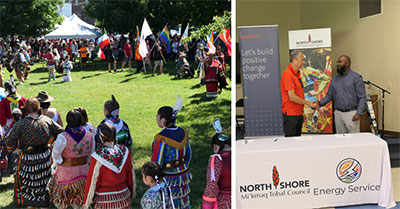Establishing long-term energy sector relationships with Indigenous partners

The energy sector, like many industries throughout Canada, is seeking ways to respond to the Truth and Reconciliation Commission’s 94 Calls to Action. Collectively, they address the long-term impact of the abuse and indoctrination that Indigenous children suffered in government-sponsored religious residential schools from the 1800s to late 1900s.
The Truth and Reconciliation Commission was established in 2008 to document these injustices and, in 2015, published the Calls to Action to serve as a framework for reconciliation in numerous areas, including education, job creation, essential services, housing, and health care.
One of the Calls to Action – No. 92 –specifically addresses Canadian businesses and industry, urging the corporate sector to advance economic reconciliation with Indigenous Peoples.
The overriding question is: How?
While there isn’t a singular answer, the energy sector is well positioned to comply with No. 92 by providing Indigenous communities with equitable access to jobs, training, and educational opportunities.
Indigenous approach
Currently, one of the energy sector’s biggest challenges is the lack of an established supply chain to support the transition to net-zero, particularly in the context of the anticipated increase in deployment of nuclear energy. Due to years of status quo within the nuclear industry in Canada, supply chains have developed to support Canada Deuterium Uranium technology but haven’t kept pace with the recent growth and advancement of small modular reactors (SMRs). In response, the Government of Canada launched the SMR Action Plan in December of 2020, which included the call for meaningful engagement from Indigenous organizations that will hopefully lead to business partnerships between Indigenous and non-Indigenous entities in this industry.
A significant number of energy projects involve Indigenous-owned land or interests. Having Indigenous representation on the development side of the project can help enhance the effectiveness of Indigenous stakeholder engagement and help ensure that much-needed energy projects are able to progress in a manner that will collectively serve the interests of all Canadians.
For reconciliation to be meaningful, Indigenous-owned businesses need to have greater control over economic development activities in their territories. They also need access to more educational and training opportunities that lead to jobs in the science, technology, engineering, and math (STEM) fields. The Conference Board of Canada reports that while 4% of Canadian adults are Indigenous, less than 2% of people working in STEM jobs are Indigenous1.
Partnering for success
Indigenous-owned businesses that form mutually beneficial partnerships with non-Indigenous organizations with complementary capabilities can serve as a supportive environment for capacity building that will ultimately support the needs of the clean energy transition.
According to a report titled “The New Reality” on Clean Energy Canada’s website2, an upcoming spike in labor demand is anticipated to accompany Canada’s efforts to transition to a net-zero energy environment. With jobs in clean energy expected to grow to almost 640,000 by 2030, representing a 50% increase over 2020, there will be significant opportunities for careers in technical fields. And with the passage of Canada’s C-50 Sustainable Jobs Act3, which prioritizes diversity and inclusion in the net-zero workforce, there should be clear opportunities to draw more Indigenous workers into the energy sector.
Additionally, the Canadian government has reinforced its commitment to Indigenous support by requiring federal departments and agencies to ensure a minimum of 5% of federal contracts are held by Indigenous suppliers.
All of which presents opportunities for meaningful partnerships between Indigenous and non-Indigenous entities in the nuclear field and the broader energy sector. Partnerships that increase Indigenous participation in the labor force and give them a voice in the decision-making process as it relates to the impact projects may have on their communities.
In support of Indigenous reconciliation and economic self-determination, alliances between an established business and an up-and-coming Indigenous business can provide extensive benefits for Indigenous communities, including:
- Serving as an incubator for increased participation in the energy sector
- Enabling access to greater opportunities for economic growth
- Increasing the Canadian labor pool and supply chain
- Increasing educational opportunities for youth (especially in STEM fields)
Looking ahead
Promoting partnerships between Indigenous and non-Indigenous entities can help to significantly develop capacity within Canada to support clean energy while also addressing the Truth and Reconciliation Commission’s Calls to Action4.
Canada is well positioned to be a leader in the global nuclear industry as the world undergoes a clean energy transition, given the technical capability of our workforce, best-in-class regulating, and a strong domestic supply chain. Without opening opportunities to engage Indigenous peoples to advance nuclear projects, operate and maintain assets, and manage waste, Canada will be missing an opportunity to fully leverage its resources, in its pursuit of net-zero aspiration, and continued global prominence as a nuclear energy producing nation.
Joint resources
Hatch has found there is increasing interest among its clients to ensure they are working with engineering firms that share like-minded values and are eager to collaborate with Indigenous communities and Indigenous-owned businesses.
Currently, we are establishing a joint venture (JV) with the North Shore Mi’kmaq Tribal Council (NSMTC), one of the Indigenous organizations involved in the SMR Action Plan.
The long-range strategy is for NSMTC to leverage its connections to their Member Nations and Hatch’s well-established position as a professional service provider within the nuclear industry. In doing so, the JV will serve as an important link between underutilized talent within the Indigenous labor pool and the soon-to-be understaffed nuclear supply chain in Canada.
Overall, the goal is for the JV is to evolve into a 100% Indigenous owned and staffed firm within 10 years. The JV intends to target energy, resource, and infrastructure development projects, and aims to provide significant value to developers by bringing together technical expertise and Indigenous knowledge and experience.
References
- [1] Conference Board of Canada, “How can more Indigenous people access STEM careers?”, 2024
- [2] The New Reality - Clean Energy Canada
- [3] The Canadian Sustainable Jobs Act Becomes Law - Canada.ca
- [4] Delivering on Truth and Reconciliation Commission Calls to Action (rcaanc-cirnac.gc.ca)
Join us in celebrating and supporting the rich heritage and innovative spirit of Indigenous communities. Learn more about our collaborative projects that drive sustainable growth, respect cultural traditions, and create meaningful opportunities:
- Hatch and NSMTC establishing joint venture to offer Indigenous-led engineering and professional services
- Hatch, Canada’s top privately held engineering, project management, and professional services firm, signs joint-venture agreement with First Pac West
- Hatch signs MOU with Indigenous-owned X-Terra to jointly deliver environmental solutions in Saskatchewan
- Voisey's Bay Mine Expansion: mine expansion in a JV partnership with Sikumiut Environmental Ltd. (SEM), an Inuit-owned, St. John’s-based environmental company
- Kashechewan First Nation flood-risk forecasting and mitigation
- Tłı̨chǫ All Season Road, Northwest Territories
- Hatch celebrates International Day of the World’s Indigenous Peoples and launches Reconciliation Action Plan in Canada
